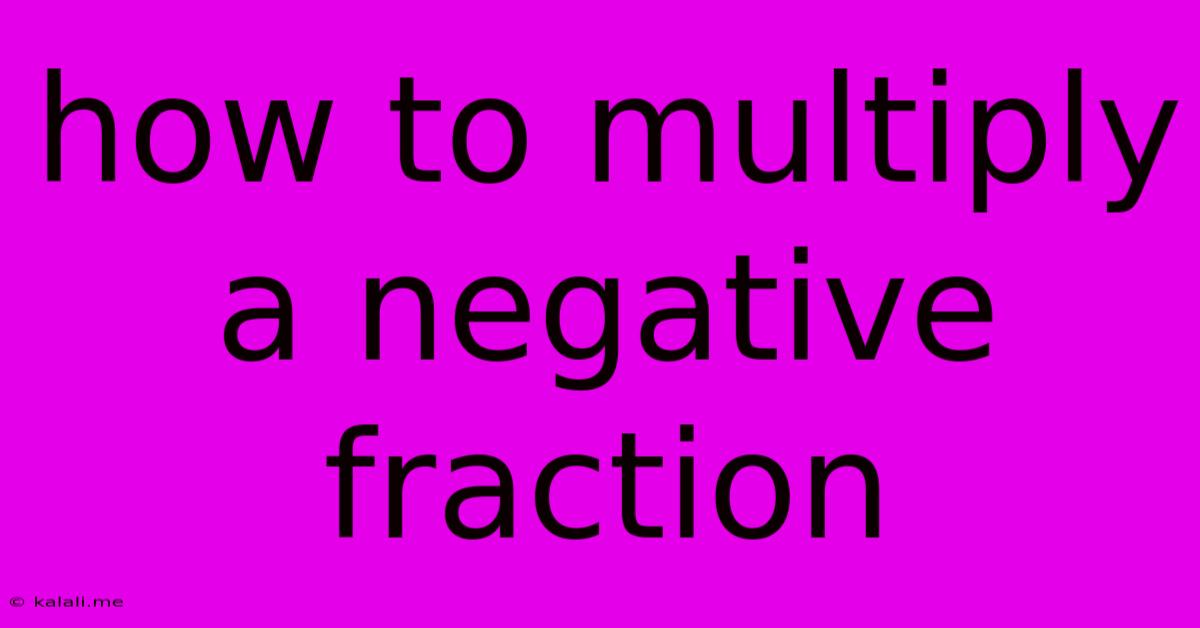How To Multiply A Negative Fraction
Kalali
May 10, 2025 · 3 min read

Table of Contents
How to Multiply a Negative Fraction: A Step-by-Step Guide
Multiplying fractions can seem daunting, especially when negative numbers are involved. But with a clear understanding of the process, it becomes straightforward. This guide provides a simple, step-by-step method for multiplying negative fractions, ensuring you master this essential math skill. This article will cover the rules, provide examples, and offer tips to help you confidently tackle any negative fraction multiplication problem.
Understanding the Basics: Multiplying Fractions
Before diving into negative fractions, let's review the fundamentals of multiplying fractions. The process involves multiplying the numerators (top numbers) together and the denominators (bottom numbers) together. For example:
1/2 * 3/4 = (1 * 3) / (2 * 4) = 3/8
The Rule for Multiplying Negative Fractions
The key to multiplying negative fractions lies in understanding the rules of multiplying positive and negative numbers:
- Positive * Positive = Positive
- Negative * Negative = Positive
- Positive * Negative = Negative
- Negative * Positive = Negative
When multiplying fractions with negative signs, treat the negative sign as part of the numerator. Then, follow the standard fraction multiplication process. The sign of the resulting fraction will be determined by the rules outlined above.
Step-by-Step Guide to Multiplying Negative Fractions
Let's break down the process with a step-by-step example:
Problem: (-2/3) * (4/-5)
Step 1: Ignore the signs initially.
Focus solely on multiplying the numerators and denominators:
(2/3) * (4/5) = (2 * 4) / (3 * 5) = 8/15
Step 2: Determine the sign of the result.
We have a negative numerator (-2) and a negative denominator (-5). Since a negative multiplied by a negative is positive, the final answer will be positive.
Step 3: Combine the sign and the fraction.
Therefore, the final answer is +8/15 or simply 8/15.
More Complex Examples
Let's try some more complex scenarios:
Example 1: (-1/2) * (3/-4) * (-5/6)
- Multiply the numerators and denominators separately: (1 * 3 * 5) / (2 * 4 * 6) = 15/48
- Simplify the fraction: 15/48 = 5/16
- Determine the sign: We have three negative numbers. An odd number of negatives results in a negative product.
- Combine sign and fraction: The final answer is -5/16.
Example 2: (-3/7) * (14/9)
- Multiply numerators and denominators: (3 * 14) / (7 * 9) = 42/63
- Simplify the fraction: 42/63 = 2/3
- Determine the sign: One negative and one positive results in a negative product.
- Combine sign and fraction: The final answer is -2/3.
Tips and Tricks
- Simplify before multiplying: Reduce fractions to their simplest form before performing the multiplication to make the calculation easier.
- Cancel out common factors: Look for common factors in the numerators and denominators to simplify the fractions before multiplying.
- Use a calculator (with caution): Calculators can be helpful, but make sure you understand the process. Always check your answer manually, especially when dealing with negative numbers.
Mastering the multiplication of negative fractions is crucial for success in algebra and beyond. By following these steps and practicing regularly, you'll develop confidence and accuracy in solving these types of problems. Remember, consistent practice is key to building your math skills.
Latest Posts
Latest Posts
-
What Is 20 Percent Off Of 39 99
Jul 03, 2025
-
Where Is The 3 In Riddle Transfer
Jul 03, 2025
-
How Much Does A Water Bottle Weight
Jul 03, 2025
-
How Many Inches Is Half A Yard
Jul 03, 2025
-
How Old Are You If Your Born In 1996
Jul 03, 2025
Related Post
Thank you for visiting our website which covers about How To Multiply A Negative Fraction . We hope the information provided has been useful to you. Feel free to contact us if you have any questions or need further assistance. See you next time and don't miss to bookmark.